Peace and Nonviolence

The world is swirling with issues.
Picking up my phone and opening my news app each morning is being met with more and more dread each day.
When something hits the news, it is fascinating to watch people jump onto social media and begin “yelling" out their answers for how to heal our broken systems.
Of course, there are almost always at least two completely different opinions for how these problems should be fixed, which typically leads to people drawing lines in the sand, picking their stance, and not budging. Relationships often fracture and a polarized a world gets more polarized, rendering it immobilized for the work of reconciliation.
Whether it’s on our Facebook page, Twitter feed, or around our table, I assume most of us can think of an interaction where this unhelpful and potentially destructive reality played out.
So, does this “yelling” of our opinions actually help heal the broken systems and the people whom those systems are breaking?

I love Jon Stewart. I mean, like “maybe jump the fence” love him. His presence on The Daily Show has spoken to and with my generation through some of our most formative years.
And yes, he tells fart jokes (which I also love). And yes, he editorializes, (which is nearly ubiquitous in “legitimate news” streams anyway). But he also often names what people are thinking, feeling, or what they can’t even put into words.
And then he helps us laugh about it, and at ourselves.
On a recent episode of The Daily Show, however, he took a more sober tone when talking about the slaughter in the headquarters of the French satire magazine, Charlie Hebdo. One comment in particular that he made stuck with me, not because it was funny or witty. Rather, it pointed to something we all need to consider more seriously, I think.

A horrific attack on a satirical magazine that mocked Islam left 12 people dead on Jan. 7 and put the Muslim community on edge.
The hunt is now on for the assailants, two or three masked men who witnesses and police say opened fire with automatic weapons inside the office of French weekly Charlie Hebdo.
“People are exploiting this one way or another,” said Fateh Kimouche, 38, the founder of Al Kanz, a prominent French Muslim blog.
“The terrorists didn’t distinguish what faith their victims were from. … I just found out that one of the cops killed, his name was Ahmed. Even Muslims aren’t safe.”
The three gunmen who attacked the magazine during an editorial meeting reportedly shouted “Allahu Akbar,” and described themselves as al-Qaida in Yemen. They killed prominent cartoonists, staff members and two police officers in what French officials described as a carefully planned and executed attack.
The French weekly has drawn the ire of Muslims before. Its offices were firebombed in 2011, after a spoof issue skewering Muhammad, the Muslim prophet. A year later, the magazine published crude caricatures of Muhammad, shown naked and in sexual poses. Most Muslims object to any depictions of the prophet, even if reverent.
Reaction — and condemnation — was swift.
Armed with AK-47s and a rocket-launcher, three masked attackers opened fire in the office of a French newspaper, killing two police officers and ten staff. After hijacking a car, the attackers are currently on the run. Parisian authorities are evacuating local schools and guarding other newspaper offices as they scour the city.
According to the Guardian, French President François Hollande has described the shooting as “a terrorist attack, without a doubt” and raised the terror alert in Paris to its highest level. This would not be the first time the magazine was subjected to terrorist attack. In an analysis of Charlie Hebdo’s commitment to satire, the Guardian reports:

In 2002, at a time when insurance providers were unwilling to provide coverage for losses resulting from acts of terrorism, and when construction and utility companies were stalling in their development projects, Congress passed the Terrorism Risk Insurance Act (TRIA). They decided to socialize some of the financial risk, giving a federal government guarantee on insurance payouts exceeding 100 million dollars.
Over the next 12 years, Presidents Bush and Obama and six different Congresses made countless decisions to increase the risk of terrorism (and of a bailout under TRIA). Of course, the most brutally profound effects of those decisions were imposed on children, women, and men in other parts of the world. Likely the least affected people were the ones complaining in the business sections of major papers last month.
They are worried because TRIA expired January 1. An unexpected fluke on the last day of the last congressional session is to blame. “Everybody expected this would get done,” fumed Manhattan developer Douglas Durst, to New York Times reporter Jonathan Weisman.
He won’t be waiting all that long — House Speaker John Boehner promised the Baltimore Sun to “act very quickly” to renew TRIA when Congress reconvenes.
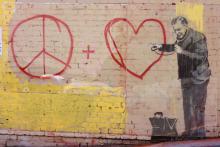
Christmas is a time for celebration, joy, and family. But Christmas is much more than a sentimental holiday.
Christmas is subversive.
The Bible doesn’t tell us the specific date Jesus was born. Later Christians tradition gave us the date of December 25. It was chosen by Pope Julius around the year 350 and Christians have been celebrating Christ’s birth on that day ever since.
But Pope Julius didn’t just randomly pick December 25. He was deliberate. As Marcus Borg and John Dominic Crossan claim in their book The First Christmas, when Pope Julius declared December 25 as the date to celebrate Christ’s birth, he integrated “it with a Roman solstice festival celebrating the ‘Birthday of the Unconquered Sun.’ The Roman birthday of the sun became the Christian birthday of the Son.”
That last sentence isn’t just a cute turn of phrase. It symbolizes the subversive quality of Christmas.

Hope is not a feeling. It is a decision — a choice you make based on what we call faith or moral conscience, whatever most deeply motivates you.
I have said that for many years, but this Advent and Christmas season tests my words — even in my own heart.
This is not a time that many of us are feeling a great deal of hope. I hear that from many friends and allies as well.
In fact, many events this year feel like they have sucked the hope right out of us.
And yet, even in the midst of terrible events and stories, the possibilities of hope still exist depending on what we decide to do for reasons of faith and conscience. In fact, people of faith and conscience are already making a difference in the most difficult situations and places.
And that gives me hope. This season of Advent, in the Christian tradition, is a call to patient waiting.
Christmas is the celebration of God literally coming into the world in order to change it.

The letter arrived at work about two weeks after baseball’s opening day in 2003. It had a Zanesville, Ohio, postmark. A return address sticker mentioned a Mrs. Howard Richardson.
What‘s this about?
Inside was a handwritten note along with a neatly clipped copy of my Cincinnati Reds season preview story from the Zanesville Times Recorder. I didn’t have to read far to get the gist.
This Mrs. Howard Richardson — she wasn’t happy with me. Not at all.
In beautiful cursive — the kind of handwriting you don’t see anymore — she pointedly took me to task for suggesting the Reds could be awful that season. I should be more positive, she insisted. It would help the players.
“You get more flies with honey than vinegar!!!!!” she wrote. (Yes, underlined and topped off with many exclamation points.)
The note was signed: Evelyn Richardson.
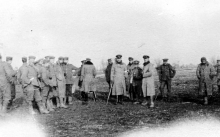
One hundred years ago, during the First World War, the Christmas truce took place between British, German, and French soldiers in the trenches on the Western Front. On Christmas Eve 1914, soldiers from opposing sides, who were stationed there to kill each other, instead got to know one another, shared photos of loved ones, and even had a game of soccer.
This of course made their superiors furious, not just because the troops were disobeying orders, but because it is much harder to harm someone with whom you have formed some sort of relationship. The enemy is to be faceless and nameless.
The same holds true for millions of people living in poverty around the world this Christmas. They are the faceless and nameless ones. In reality though, the enemy that is poverty is not faceless. Poverty is about people; it is not about statistics. Poverty is also not just about a lack of material goods; it is more about a lack of dignity, a lack of a sense that you are important. We are reminded that poverty is always personal because it is about relationship.

Unfortunately, we will not be able to watch Kim Jong-un’s assassination on the big screen this Christmas. We will not be able to cheer as the brutal dictator’s helicopter explodes in the air “ while Katy Perry’s ‘Firework’ plays on the soundtrack.” We will not be able to fulfill this Christmas Day fantasy by watching The Interview because the terrorists have won.
The FBI now claims that Kim Jong-un’s government is behind the act of terrorism. In retaliation for the movie, a state-sponsored North Korean cyber-terrorist group called “The Guardians of Peace” hacked into Sony Pictures and leaked sensitive information, including internal emails, future Sony films, and sensitive employee records. “The Guardians of Peace” also threatened movie goers with a “9/11 style attack” on every cinema that shows the movie.
After the threats were made and many theaters decided to pull the film, Sony Pictures canceled the release of The Interview. Sony said in a statement:
Sony Pictures has been the victim of an unprecedented criminal assault against our employees, our customers, and our business. Those who attacked us stole our intellectual property, private emails, and sensitive and proprietary material, and sought to destroy our spirit and morale – all apparently to thwart the release of a movie they did not like. We are deeply saddened at this brazen effort to suppress the distribution of a movie, and in the process do damage to our company, our employees, and the American public. We stand by our filmmakers and their right to free expression and are extremely disappointed by this outcome.
Washington and Hollywood are also in an uproar:
“Wow. Everyone caved. The hackers won. An utter and complete victory for them,”tweeted Rob Lowe. Jimmy Kimmel claimed that pulling the movie was, “an un-American act of cowardice that validates terrorist actions and sets a terrifying precedent.” Steve Carell said it was a, “Sad day for creative expression.” Sen. John McCain stated “yielding to aggressive cyber-terrorism by North Korea … sets a troubling precedent that will only empower and embolden bad actors to use cyber as an offensive weapon even more aggressively in the future.”
And White House officials are exploring retaliation, saying security leaders “would be mindful of the fact that we need a proportional response.”
The terrorists may have won the battle, but the United States will win the war!

Since June 18, 2004, the first day U.S. drones killed people in what has been called the U.S. “global war on terror,” people of faith have questioned whether the use of lethal drones is justifiable.
Since then, the CIA has conducted an estimated 400 or more drone strikes in Pakistan, Yemen and Somalia. Drone strikes are continuing in Syria and Iraq. Hundreds of civilians have been killed, according to the Bureau of Investigative Journalism, including women and children.
These “targeted” killings are conducted remotely in countries against which we have not declared war. Lethal drone strikes occur without warning, target for death specific individuals who are secretly selected, and are operated remotely by individuals thousands of miles away.
The U.S. religious community questions the morality of such drone warfare.
Many people of faith who are not pacifists adhere to the “Just War” tradition as enshrined in international law, which assumes that war is always an evil, but that sometimes there is a greater evil that requires military force.
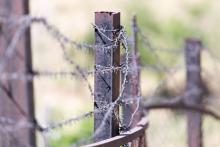
The release of a 600-page executive summary of the CIA torture report on Tuesday gave confirmation and imagery to many of our saddest suspicions and vague understandings of the CIA’s use of torture. The report, conducted by the Senate Intelligence Committee between 2009 and 2013, reveals that the U.S. carried out post-9/11 “enhanced interrogation techniques” in an ineffective and fear-fueled effort to prevent terrorism. In an attempt to protect our nation, we lost our values, and then tried to destroy the evidence. Still, many shameful specifics are now public knowledge:
Interrogators have exposed detainees to dark, cold isolation, forced rectal feedings, threats to family members, simulated drowning, 180 hours of sleep deprivation, and much more. The Justice Department still hasn’t pressed any federal charges.
This government transparency is new, but the sins are old. Sojourners has advocated for the end and exposure of U.S. torture techniques for years. Take a look at the Sojourners articles below to learn more about the effects of the program and the dreary history that precipitated the report.
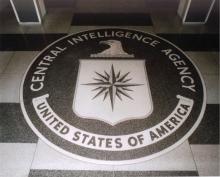
The release of the Senate Intelligence Committee’s report detailing the CIA’s brutal post-9/11 torture program is a watershed moment for the values of our nation. The report contains some serious truth-telling. The CIA consistently lied to Congress, the DOJ, White House staff, and the public about its torture program. The torture program’s cruelty was much worse and its effectiveness far less than Congress and the general public were led to believe. The CIA violated a court order by destroying videotapes documenting torture, and used bribes to secure secret sites used for torture in a number of countries. This isn’t an example of our government at its best; it’s an example of how to carry out a cover-up.
The entire rationale for the CIA’s torture program is undercut by the conclusions of this report. In the words of Committee Chair Sen. Dianne Feinstein (D-Calif.), as she spoke about the report on the floor of the Senate, “Even if one were to set aside all of the moral arguments, coercive interrogation techniques did not produce the vital, otherwise unavailable intelligence the CIA has claimed.” Immoral and illegal, we now know that the program was also ineffective.
A broad array of faith leaders have responded to the Torture Report by condemning the CIA’s torture program. For followers of some faiths, torture violates the image of God; for others, it is an intrinsic evil. People of all faiths, though, hold human life to be sacred, and the long shadow torture casts on the moral integrity of our nation represents a travesty of justice as well as a flagrant violation of human rights. Dr. Roy Medley, General Secretary of American Baptist Churches USA, makes a plea that could almost serve as a benediction to the whole sordid chapter of this history of torture: “May God give us the moral courage to never again betray the core principles that have guided our nation as a leader in the struggle for human rights.”
Now the hard work in Congress begins to ensure that torture never, ever happens in the name of our nation.
ON A COOL, windy October evening, the family of 23-year-old Dominic Amey Jr. stands outside and waits. They’re waiting for someone to tell them how and why Amey, a father of three, was shot and killed behind the house a week before. So they pray and they wait. But there aren’t any answers—at least none that night.
Joe Zelenka, a 74-year-old Catholic, wishes he had answers, but instead he offers the family what he has: prayers for peace and healing.
Zelenka has done this many times (probably too many times, if you ask him) since he began coordinating the Church Federation of Greater Indianapolis’ prayer vigils for homicide victims—many killed by gun violence—nearly 11 years ago. At every vigil, standing at the scene of the crime, Zelenka reads scripture, offers a prayer, and then invites those present to pray aloud if they so choose.
“I think it’s important that we bring God’s presence where violence has occurred,” he said. The vigils pre-date Zelenka’s tenure with the Church Federation—he’s the fourth person to hold the position of vigil coordinator since January 1996, when the Church Federation began holding a prayer vigil at the site of every violent homicide in the greater Indianapolis area.
“There is neither Jew nor Greek, there is neither slave nor free, there is no male and female, for you are all one in Christ Jesus.” Galatians 3:28
Thirty-five million people are trapped in a form of modern slavery.
35 million. Let that sink in.
Last week, the campaign to end human trafficking took a large step forward. Religious leaders from the Christian Catholic, Anglican, and Orthodox traditions joined with Hindu, Buddhist, Jewish, and Muslim leaders to jointly declare their intention to end modern-day slavery. The Joint Declaration of Religious Leaders Against Modern Slavery reads:
We pledge ourselves here today to do all in our power, within our faith communities and beyond, to work together for the freedom of all those who are enslaved and trafficked so that their future may be restored. Today we have the opportunity, awareness, wisdom, innovation and technology to achieve this human and moral imperative.
The moral imperative to end human slavery transcends every religious doctrine.
Christian Scripture affirms that “there is neither slave nor free, for you are all one in Christ.” The Qu’ran confirms the divine dignity of each human stating, “God has given dignity to the all children of Adam” (The Noble Qur’an, 17:70). The command to “protect the stranger in our midst” (Exodus 22:21) appears 36 times in the Torah — which according to the Talmud is more often than the laws of the Sabbath or of keeping kosher. Hindu leader, Her Holiness Mata Amritanandamayi called human enslavement, “an open wound on the body of modern society.”
Each major religious tradition acknowledges the inherent God-given dignity of each being. An excerpt from the declaration affirms that:
In the eyes of God, each human being is a free person, whether girl, boy, woman or man, and is destined to exist for the good of all in equality and fraternity. Modern slavery, in terms of human trafficking, forced labour and prostitution, organ trafficking, and any relationship that fails to respect the fundamental conviction that all people are equal and have the same freedom and dignity, is a crime against humanity.
An international faith declaration will not change the complex causes, intricate networks and international power structures that run deeply through the roots of modern slavery.
Yet, it is a start.

Peace, with its connotation of tranquility and stillness, is the Christian’s most misunderstood concept. We have long sought to keep peace by silencing dissent under the guise of pursuing unity, coated with a zealous concern for niceties, unwilling to budge a status quo. We forget to ask the crucial question: for whom do we keep peace?
Wherever peace is elusive, the first ones to suffer are the vulnerable.
When corporations engage in legal battles, employees who don’t get a vote have the most at stake. When marital tensions rise high, children’s tender spirits lay at the parents’ mercy. When war ravages a country, the displaced peoples helplessly suffer.
When keeping the peace only benefits the powerful, it is not a Christian peace. The sweet baby Jesus portrayed in sentimental Christmas cards has taken an abrupt departure from the kind of peace we see Jesus embody in Scripture. Even as an infant, the baby Jesus so disrupted the power authorities of the day that sent them scrambling into every home killing firstborn baby boys.
Christian peace is not about coddling people’s fear of conflict. It isn’t about making sure everyone is comfortable. It does not silence those for whom a lack of peace is a life or death situation. The irony is that often, the ones with feeble power are the ones who are told to keep peace and remain silent.
When the society is disrupted by scandalizing conflict — whether it is the Bill Cosby rape accusations, or the “harsh disciplinary methods” of certain celebrity parents, or an entire neighborhood weary of losing their young men to police violence — the Christian dare not keep peace by silencing the voice of the victims.
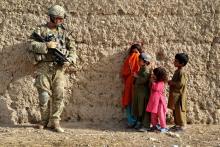
News agencies reported Saturday morning that weeks ago President Obama signed an order, kept secret until now, to authorize continuation of U.S. military operations in Afghanistan for at least another year. The order authorizes U.S. airstrikes “to support Afghan military operations in the country” and U.S. ground troops to continue normal operations, which is to say, to “occasionally accompany Afghan troops” on operations against the Taliban.
The administration, in its leak to the New York Times, affirmed that there had been “heated debate” between Pentagon advisers and others in Obama’s cabinet chiefly concerned not to lose soldiers in combat. Oil strategy isn't mentioned as having been debated and neither is further encirclement of China, but the most notable absence in the reporting was any mention of cabinet members’ concern for Afghan civilians affected by air strikes and ground troop operations, in a country already afflicted by nightmares of poverty and social breakdown.
While the concern for civilians may have been discussed even if not reported, it’s worth pointing out some of the suffering people on the ground continue to experience. Here are just three events, excerpted from an August 2014 Amnesty International report, which President Obama and his advisors should ha considered (and allowed into a public debate) before once more expanding the U.S. combat role in Afghanistan:
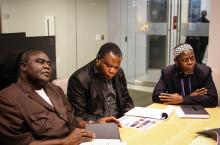
“Since you are believers, I will speak to you as believers,” the archbishop told us, before explaining how he and his two colleagues — a Muslim imam and an evangelical pastor — have drawn on their faith in order to work for peace and reconciliation in Central African Republic (CAR). “If we want our hearts to be … like the heart of God, we need to learn to love other people, we need to learn to live in peace with them and to take them in. This is the only way we will be true children of God."
When the Seleka, a loose coalition of predominantly Muslim rebels, overturned CAR’s government in 2013, the anti-balaka, a loose coalition of predominantly Christian fighters, began to retaliate. At face value, the conflict seemed to be a religious one, event though Christians and Muslims in CAR have co-existed in relative peace for much of its 50-year history. Yet the twin forces of political instability and lack of economic opportunity have created an environment in which militias and rebel groups can prey upon young, unemployed men who see no hope for a future unless they fight for it.
Despite the chaos and conflict that have raged throughout CAR since March 2013, Dieudonné Nzapalainga, the Catholic Archbishop of Bangui, Imam Oumar Kobine Layama, President of the Central African Islamic Community, and Rev. Nicolas Guérékoyame-Gbangou, President of the Evangelical Alliance of the Central African Republic, have united to teach their flocks what it means to be “true children of God.” As news reports have focused on the violence and displacement of some 800,000 Central African Republicans, these three faith leaders have instead focused more deeply on what their faith traditions tell them is true. And that faith has propelled them to seek peace and reconciliation in their war-torn country.
For their work, the three leaders were jointly listed among TIME’s 100 Most Influential People in April and received an award from Search for Common Ground last week.
“When politicians wanted to use the religious fibers to divide the people, whether to maintain power or to conquer it, we stood up as if we were a single man to say ‘non’ to this war and ‘yes’ to peace,” the archbishop said in his acceptance speech.

Early Thursday morning a gunman opened fire in a library at Florida State University, wounding three students before being fatally shot by police officers. Wielding a handgun, the shooter entered the library and forced hundreds of students studying for exams to flee or take cover behind bookshelves. NBC News reports:
FSU Police Department Chief David Perry said the library was “packed with students studying for final exams” and estimated that there were 300 to 400 people in the building. One group of students sought refuge behind rows of bookshelves. “Everyone started running to one side of the library, then to the back,” one 20-year-old communications student who asked not to be identified told NBC News. “People were saying, ‘Gun! There’s a shooter! Go! Go! Go!’" She said her group hid among bookcases for what she said felt like 20 minutes. Once given the all-clear, the group was escorted to a campus building next door where they stayed until 4 a.m.
Although the identity of the shooter is unknown, police officers believe he was acting alone and that there is no further threat to students at FSU.

With each bloody act, Islamic State militants demonstrate their need for self-importance overrides any moral, ethical, or religious boundary. Peter Kassig’s beheading is a microcosm of all the Islamic State wants, and religion is not high on that list.
Kassig converted to Islam and took the name Abdul-Rahman, servant of the Merciful. By many accounts, his conversion was genuine and the result of the love he felt for the people he met while providing aid in Syria. His former military service could have made him reluctant to return to a region in conflict. Instead, he chose to go back and help people, risking his life to do so.
In comparison, the Islamic State exacerbates a worsening humanitarian crisis in Syria. It works to prevent aid workers like Kassig from doing their job. A broken population that has no hope is the best recruiting environment it can hope for. If Syrians get aid from Americans, it would destroy the narrative that Islamic State militants are caring for Muslims.
The Islamic State specializes in media manipulation. It uses videos of its executions to gain a response from more powerful adversaries, thus giving it more legitimacy. The world “Islamic” ties the group to something grander than political machinations and 15th-century wars. Its video game-style recruitment material exhibits a mastery of the language of modernity.
Ultimately, the group is a product of modernity, not religion.